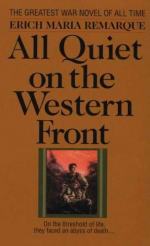|
This section contains 456 words (approx. 2 pages at 300 words per page) |

|
Maslow's Heirarchy of Needs and "All Quiet on the Western Front"
Summary: The sociological concept of Maslow's Hierarchy of Needs can explain the range of emotions and actions by Paul in the World War I novel "All Quiet on the Western Front" by Eric Remarque.
Maslow's Hierarchy of Human Needs illustrates the rank of environmental conditions humans value. The mind, which responds naturally to the level of suitability of environment conditions, becomes confused when that level is inconsistent. By the nature of the war, Paul loses the conscious connection with his physical actions which is only exhibited at when conditions warrant the higher-level needs of Maslow's Hierarchy.
It is true that Paul still experiences moments when he feels a connection to his higher-level needs, especially the inclination to love, seen in the scene with the Frenchman: "I see your wife and your face and our fellowship. Forgive me, comrade... you could be my brother"(223). However, this feeling does not last: Paul realizes that "[i]t was only because I had to lie there with him[the Frenchman] so long... After all, war is war"(229).
The detachment of conscience results from the necessary instinct...
|
This section contains 456 words (approx. 2 pages at 300 words per page) |

|


